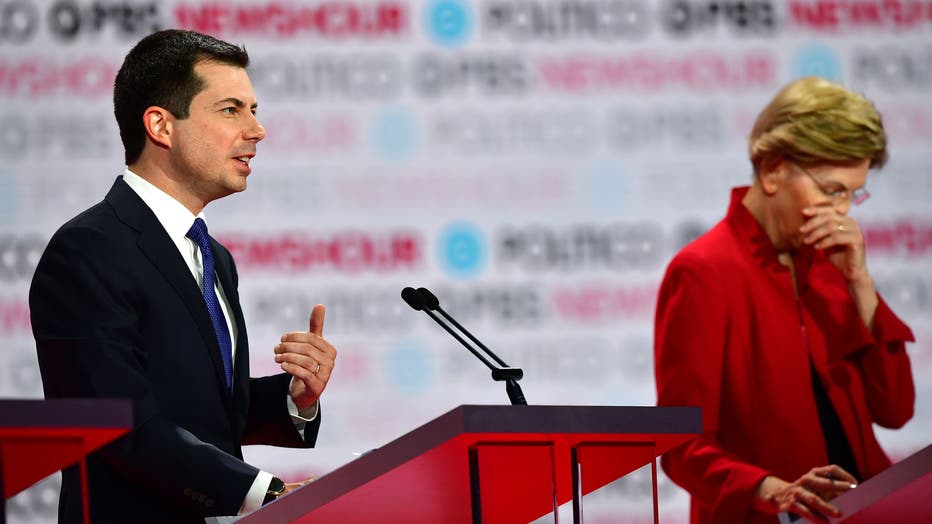Buttigieg put on defensive at debate over pricey fundraisers
LOS ANGELES (AP) - Campaign cash emerged as a new dividing line in the Democratic Party’s high-stakes primary fight on Thursday night as two leading White House hopefuls clashed over how best to beat back President Donald Trump's sprawling reelection campaign.
Seven candidates shared the stage in Los Angeles in what was their party’s final presidential debate of 2019, but it was Pete Buttigieg, the 37-year-old mayor of South Bend, Indiana, who saw the most incoming fire on the debate stage, particularly from Elizabeth Warren, who seized on his reliance on wealthy donors. Another candidate, Amy Klobuchar, challenged his experience in what opened as a tame event but intensified as time went on.
In the most pointed exchange, Warren, a 70-year-old Massachusetts senator, zeroed in on Buttigieg's recent private meeting with wealthy donors inside a California “wine cave," the details of which were recounted in a recent Associated Press story.
“Billionaires in wine caves should not pick the next president of the United States," she charged.
Buttigieg, who has surged into the top tier of the Democratic Party's 2020 primary in part because of his fundraising success, did not back down.
“We need to defeat Donald Trump,” he responded, noting that Trump’s reelection campaign has already accumulated hundreds of millions of dollars. “We shouldn’t try to do it with one hand tied behind our back."
The clash underscored broad questions that loom over the Democratic Party’s 2020 contest just 46 days before primary voting begins: Democrats are not close to unifying behind a message or messenger in their quest to deny Trump a second term.
In fact, as Thursday’s clash revealed, the party is still consumed by a high-stakes tug-of-war between feuding factions that must ultimately come together in order to beat Trump next November. One side, led by Warren and Vermont Sen. Bernie Sanders, is demanding transformational change to the U.S. economy and political system. The other, led by former Vice President Joe Biden, Buttigieg and Klobuchar, prefers a more cautious return to normalcy after Trump’s turbulent reign.

Democratic presidential hopeful Mayor of South Bend, Indiana Pete Buttigieg (L) and Massachusetts Senator Elizabeth Warren participate of the sixth Democratic primary debate of the 2020 presidential campaign season.
Buttigieg, who is polling well in early voting states Iowa and New Hampshire, has grappled with questions about his fundraising, an issue that has exposed the fissure between the moderate and progressive wings of the party.
Over just the last week, he hosted wealthy donors at a California wine cave, disclosed consulting work for a big insurance company that preceded layoffs and released a list of wealthy bundlers. His challenges with black voters are well documented, but suddenly, Buttigieg's corporate connections are beginning to alienate the party's progressive activists.
Protesters aligned with Warren and Sanders tracked him across New York City during a recent fundraising swing, banging pots and pans and calling him “Wall Street Pete.” The 37-year-old seemed genuinely confused by the protests, which he was forced to acknowledge during at least one Manhattan fundraiser because the noise outside was so loud.
“I do not sell access to my time," Warren said of Buttigieg's aggressive fundraising schedule.
“As of when, Senator?" Buttigieg fired back, referring to Warren's reliance on wealthy donors before becoming a presidential candidate.
Klobuchar, a Minnesota senator, went after Buttigieg for criticizing the combined experience of all the senators who participated in a previous debate.
“So while you can dismiss committee hearings, I think this experience works. And I have not denigrated your experience as a local official — I have been one. I just think you should respect our experience when you look at how you evaluate someone who can get things done.”
Buttigieg responded: “You actually did denigrate my experience, Senator.”
Amid the ideological fight, Democrats faced a pointed challenge related to their need to build a diverse coalition to win the general election. For the first time this primary season, no black or Latino candidate appeared onstage.
The omission was embarrassing, at best -- and politically dangerous, at worst -- as Democrats fight to convince people of color that they're not taking their vote for granted.
Asked what message the lack of diversity on the debate stage sends, Sanders tried to shift the conversation back to a discussion about climate change.
Admonished by one of the moderators to stick to the question, Sanders countered that people of color will suffer “the most if we do not deal with climate change.”
The only nonwhite candidate on stage, Andrew Yang, called it “both an honor and a disappointment” to be the only candidate of color on the debate stage. He said he missed California Sen. Kamala Harris, who folded her campaign this month, and New Jersey Sen. Cory Booker, who failed to qualify. “I think Cory will be back,” Yang predicted.

